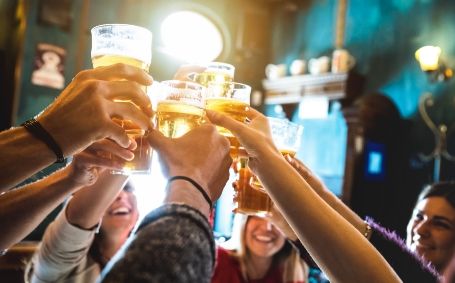Frequently asked questions
Frequently asked questions
Helping people make informed choices about alcohol.


Frequently asked questions
On the internet there are many tests that indicate whether you'd better change your drinking habits to maintain good health. Examples of drinking tests are: http://www.drinktest.nl/ or http://www.alcoholenik.nl/zelftest/ or http://www.rupissed.com/
Alcohol is a product which is produced by fermentation of grains or fruits. The natural fermentation stops at approximately 15% alcohol. By distilling (heating and cooling) of weak alcoholic beverage creates higher alcohol levels (ie spirits). Beer is made from cereals, wine grapes and spirits of all kinds of products. Gin grains, cognac and grape vodka from potatoes. Pure alcohol is a clear, colorless liquid, with no specific taste. It is very poisonous. Beer is on average 5% alcohol, wine 12%, spirits 35% to 80%.
Alcohol affects your body and psychological state. Initially indicates drinking alcohol often feel comfortable, but you drink more than a glass or two, then the consequences for your physical and mental state and behavior. Drinking a large amount of alcohol during an occasion makes great health risks. The more alcohol you drink, the greater the effects and risks.
Drinking alcohol has drawbacks. Do you drink more frequently than guideline for responsible drinking? Then it can cause consequences for your health. Did you drink a lot of alcohol the previous evening? Then you have a great chance of a hangover and headache. In certain situations, supplies drinking extra risks: before, during and after pregnancy, in combination with drugs, alcohol and disease.
One person is experiencing the effects of alcohol stronger and faster than the other person. This has, among other things to do with age, body weight, age and habituation. The advice for responsible alcohol is adjusted based on the latest research. For men: two drinks per day, of which not drink two days a week and for women one glass per day that you do not drink two days a week.
Will you stop with alcohol or alcohol becomes a problem? Make an appointment with your doctor or consult a reputable institution where you can find specific information regarding quitting alcohol. As for example at www.trimbos.nl, www.alcoholenik.nl, www.jellinek.nl etc. They offer courses where you gain insight into your own alcohol use and can eventually change your drinking or cut down or stop drinking alcohol.
The effects of quitting alcohol that you can get withdrawal symptoms. Withdrawal symptoms occur after the highly cut back or quit alcohol abuse. The symptoms differ per person, a person can and usually start within 24 hours after stopping (or significantly reduce) with alcohol. In general, the symptoms can last for 3 to 7 days.
The withdrawal symptoms of alcohol occur after the highly cut back or quit alcohol abuse. The withdrawal symptoms that gets someone can vary considerably and usually start within 24 hours after stopping (or greatly reduce) with alcohol. In general, the symptoms can last for 3 to 7 days.
The following symptoms usually occur within the first week and then decline rapidly: Trembling hands; sweating; Nauseous; Bad sleeping; Tired; restless; Raised blood pressure; Muscle cramps; are strained. Exceptions are the poor sleep and more tense. These symptoms may last longer. Symptoms that last longer may include: anxiety; gloom; Lethargy. These symptoms may last longer but will eventually over again. Many people suffer from craving, or to be the overwhelming craving for alcohol. Did you drink a lot alcohol for a long time? And you want to quit or cut down strongly with alcohol? Please contact your doctor to do this with medical supervision.
Basically comprises a standard glass of liquor as much alcohol as a standard glass of beer or wine when it is given according to the rules in a public house. When you use a beer glass full of liquor, it is of course a different story … yet it may be that you get drunk faster of liquor because alcohol is less diluted. Of beer or wine you become more 'gradual' drunk.
That depends on the type of antibiotics you use. In all cases, both the alcohol and the drugs should be broken down by the liver, so if you drink a lot it will cause extra strain on your liver and therefore not recommended. Some antibiotics should not be combined with alcohol. If that is the case then it is listed on the package insert. You can always check with your doctor or pharmacist.
Young people are sensitive to the toxic properties of alcohol, so that the development of the brains can be disturbed. The younger, the more likely you can get brain damage. Adults who drink will have this risk too, but among young people even relatively small amounts can have a negative effect.
That can indeed make a difference. When you drink on an empty stomach than alcohol is much more quickly absorbed into your blood, making you feel the effects faster and faster drunk.
There are various possibilities. There is medication that can cope with withdrawal symptoms, other medications may reduce the urge to drink, other medications you can become sick if you drink. Finally, there is also medication that reduces the 'pleasure' of drinking. Discuss the options with your doctor. It is also possible that you need to get vitamin B1. However, there is no "miracle pill" that you saved at a stroke all the problems.
Drinking alcohol can pose risks to your health. The advice for responsible alcohol is adjusted according to the most recent studies and is now, for men two drinks a day where you do not drink two days a week, for women one glass per day, you do not drink two days a week.
Not everyone is aware how much he drinks. There is increasing attention to a healthy lifestyle: healthy eating, more exercise, less stress, quit smoking. Healthy deal with alcohol fits in that list. A glass of wine or a shot is ‘normal’ for many people. If someone does not exceed drinking raises concerns for his health, then nothing is wrong with that. If you drink too much more and a longer time, it could cause serious damage to health. It is therefore advisable to consciously deal with alcohol.
Always have an open conversation and talk about the use of alcohol. Give your child beforehand to think about what to do if he or she comes into a situation where he / she will be offered alcohol. Learn to tell your child no. Always be clear.


